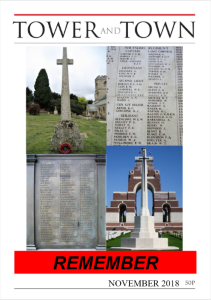

Tower and Town, November 2018 (view the full edition) (view the full edition)WWI: Armistice Day, MarlboroughThroughout October 1918 the local Journal was full of reports of Allied successes. Such stories spoke of the Allies sweeping forward, prisoners being taken, the enemy being forced back. After four years could it be the war which had taken such a toll in human misery was at last reaching a conclusion? The Allies were still pushing hard and the Germans were resisting fiercely. On 4th November, the Allies fought the last large-scale action of the Great War, the Battle of the Sambre. Two men from Marlborough were killed on the morning of the attack and another was mortally wounded. Soon after nine o’clock on the morning of the 11th of November the local Journal received a telegraph direct from France with the news that the armistice had been signed. The news was hard to believe, and confirmation was urgently sought. Within an hour the news was confirmed and a message was sent to the Mayor, Councillor George Hughes, who was taking a lesson at the College. The lesson was immediately abandoned. News flashed around the College and 700 boys flooded onto the High Street. Not much was going on there yet, other than a lone piper who was piping a lament. Crowds started to gather whilst the Beadle shouted that the Mayor would be making a proclamation at one o‘clock. Flags were hoisted on all public buildings and bunting appeared everywhere. The Mayor addressed a huge crowd that gathered in front of the Town Hall steps. He informed them that the armistice was signed at five that morning and that hostilities had ceased at eleven. Wild cheering accompanied the announcement. He made a rousing speech calling for the unity of Nations so that there could be no more wars. Children and even dogs were dressed up in patriotic garb and soldiers from the Red Cross Hospital paraded up and down the High Street banging instruments and singing patriotic songs. Back down at the other end of the High Street where the news had first broke, celebrations became somewhat more boisterous as one contemporary reported: 'When we got back to school, the boys in Upper School began to throw anything, books, ink-bottles, coal through the large windows and out-college boys who were in for lunch threw them all back again; the waste-paper baskets were burned and I personally burned all the notices. There was an unholy mess. A list was put up so that boys who had taken part in the destruction would put their names down and have ten shillings added to the bill or pay the ten bob themselves, quite a lot squeezed their pocket-money and paid. The right spirit I thought. That night we barricaded our dormitory to prevent the captains getting in and got away with it. We had a service in Chapel and so ended the first Armistice Day’. Hastily arranged services of thanksgiving were held later in the day in St Mary's and the Congregational Church. St Mary's was bedecked in bunting and a parochial roll of honour containing the names of the men who had served was proudly displayed. As the momentous day ended there was an air of incredulity. It was hard to believe that after four long years the War was over at last. Andrew Ross |